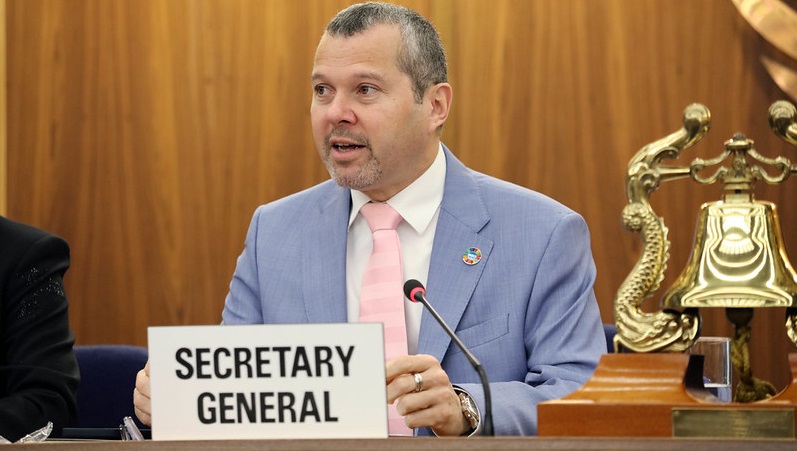The industry and governments’ maritime ministries want a proposed levy on emissions spent on cleaning up shipping, not used for wider climate goals like loss and damage
Shipping negotiators for governments at UN talks this week want a proposed tax on the sector’s emissions to be spent mostly on cleaning up the industry – which could thwart international plans to use some of the money to address broader damage from climate change.
With rich countries failing to deliver promised amounts of their taxpayers’ money to help developing countries tackle warming, global attention has turned to so-called “innovative” sources of climate finance – like levies on ships, planes or fossil fuel firms – to make up the shortfall.
But at the International Maritime Organisation (IMO), the United Nations’ shipping arm, governments have made clear they want the bulk of the revenue from a shipping emissions levy to go towards making it cheaper and easier for companies to put clean fuel in their vessels.
Sitting in the 7th-floor boardroom of the IMO’s riverside London headquarters, Arsenio Dominguez, the IMO’s new head, said “we need to focus on shipping as a sector, as that is what we regulate and that’s where we need to focus the efforts”.

IMO secretary general Arsenio Dominguez (March 18/IMO)
Asked if the money could go into a new UN fund to repair and reduce loss and damage from climate change, Dominguez told Climate Home: “That’s another UN agency – we have no remit there.” The fund, set up under UN climate change talks, is set to be hosted by the World Bank.
While conversations are at an early stage, Dominguez’s view is broadly echoed by the shipping industry – as well as by most governments that have so far submitted formal proposals at the IMO, although Pacific nations want some of the funds to be used outside of shipping.
Loss and damage fund board member Avinash Persaud, from Barbados, urged finance and environment ministers to intervene at the IMO to secure a share of any future shipping levy for addressing the harm caused by worsening extreme weather and rising seas.
Big-emitting sector
As it moves goods around the world, the international shipping industry emits a similar amount of greenhouse gases to Germany but has lagged behind when it comes to setting targets to reduce that pollution.
In July last year, governments at the IMO agreed to aim for net zero emissions in the sector “by or around, i.e. close to 2050” – with interim targets for 2030 and 2040.
At the same time, they agreed to look into putting a price on the industry’s emissions. On Monday, Dominguez said he was confident such a levy would be agreed by this time next year, although the details are still to be fought over.
While nations are split on how high the charge should be – with a group of island nations arguing for the highest tax of $150 per tonne of greenhouse gas emissions – submissions from governments, industry and campaign groups all specify that the funds should be used mainly for cleaning up shipping.

Climate protesters dressed as mermaids lie on the floor at an IMO drinks reception last year (Photo credit: Guy Reece)
Kept in house?
A joint submission from the European Union, South Korea, the International Chamber of Shipping, the Environmental Defense Fund and others says a portion of the money should go to cleaning up shipping through investments, research funding and rewards for using clean fuels.
The money should also address “disproportionate negative impacts” of the transition to clean shipping through training, technical advice and finance for green investments, it adds. An impact assessment is currently being carried out by experts under the guidance of the IMO.
Another joint submission from eight Pacific nations and Belize says the funds should be collected and spent using the principle of “the polluter pays”. That would require the shipping industry as the polluter to stop burning planet-heating fossil fuels “whilst making reparation for the impact on the environment, including people and communities”, the submission specifies.
A shipping negotiator from the climate-threatened Marshall Islands, Albon Ishoda, said the money should be “reinvested in the shipping industry to trigger research, development and deployment into zero-emission maritime technologies and to address climate mitigation efforts”, as well as in “an equitable transition” for small islands and the world’s poorest
Read More







Never miss a story. Join us on social.